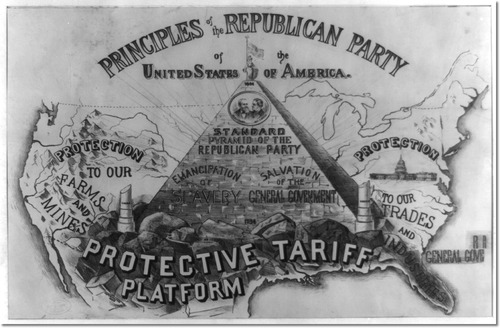
Free trade has become the Republican elephant in the room, thanks to Donald Trump.
The GOP front-runner has helped make trade one of the hot-button issues of the 2016 presidential race. And it’s tearing the Republican Party apart – just like it did in the wake of the U.S. Civil War.
Back then, a third-party run by free trade Republicans put the GOP on a protectionist course that lasted 100 years, as I’ve explored in a recent book on the topic. Could it happen again?
A Trump nomination heralds the end of decades of Republican support for free trade. Tapping into widely held GOP fears surrounding outsourcing and unfair trade practices, amid great controversy, Trump has called for punitive tariffs against three of America’s key trading partners: Mexico, China and Japan.
He has also made his condemnation of free trade agreements like NAFTA and the Trans-Pacific Partnership – a massive 12-country free trade agreement signed in early February but still awaiting ratification from every member state – the centerpiece of his campaign. As Trump recently put it: “free trade’s no good” for the United States.
On Main Street, Trump’s protectionism has found a welcome home market. His message plays on mounting anxieties surrounding free trade that pervades the white working- and middle-class base of the Republican Party. Trump’s protectionism has thus struck a resounding chord with a majority of Republican voters.
A recent Pew poll found that 52 percent of Republicans think free trade agreements are a bad thing. Among out-and-out Trump supporters, this number is even higher – a whopping 67 percent.
Noting this trend, Frank Luntz, the GOP’s longtime “messaging guru,” has instructed Republican lawmakers to “stop calling it free trade and start calling it American trade. American businesses, American services – American, American, American!”
But Trump’s protectionist promise to “Make America Great Again” has beaten the Republican political establishment to the patriotic punch.
On Wall Street, however, Trump’s protectionism is far from popular. His anti-free-trade message is out of sync with the Republican Party establishment, which includes a large portion of the U.S. business community. While some, like House Speaker Paul Ryan, remain cautiously hopeful that a Trump nomination would not derail the GOP’s laissez faire dogmas of free trade and deregulation, others, including some on the Republican National Committee, are now seriously considering running an independent ticket.
It’s become the GOP’s nuclear option.



Expositores: Oscar Vidarte (PUCP) Fernando González Vigil (Universidad del Pacífico) Inscripciones aquí. Leer más
Una retrospectiva para entender los próximos cuatro años. Leer más
En la conferencia se hará una presentación de los temas más relevantes del proceso de negociación se llevó a cabo desde el 2012, así como del acuerdo de paz firmado entre el Gobierno colombiano y la guerrilla de las FARC a finales del 2016. Se analizarán los desafíos y las... Leer más
El Observatorio de las Relaciones Peruano-Norteamericanas (ORPN) de la Universidad del Pacífico es un programa encargado de analizar y difundir información relevante sobre la situación política, económica y social de Estados Unidos y analizar, desde una perspectiva multidisciplinaria, su efecto en las relaciones bilaterales con el Perú.
© 2026 Universidad del Pacífico - Departamento Académico de Humanidades. Todos los derechos reservados.

